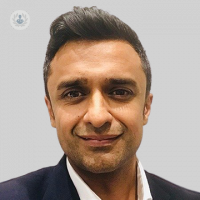Diagnosing liver conditions using Fibroscan
Written by:A liver biopsy, while effective and safe, is an invasive procedure that requires a recovery period afterwards. However, Fibroscan is a test that can remove the need for needles and days off.
Leading consultant hepatologist, Dr Deepak Joshi talks to Top Doctors about this development in liver health, why it’s an effective option and what’s involved in the procedure.

What is Fibroscan and what can it detect?
Fibroscan is a non-invasive measurement of liver scarring (fibrosis) and liver fat (steatosis). The LSM (liver stiffness measurement) relates to scarring and the CAP (controlled attenuation parameter) score relates to the amount of fat.
It is quick and painless. The test usually takes less than five minutes. It is an excellent alternative to a liver biopsy although a high reading can lead to a liver biopsy as the next step. It is accurate at identifying patients with advanced scarring (cirrhosis) and those with very little scarring.
What are the signs or symptoms that people may need Fibroscan?
Fibroscan provides a way of identifying liver disease which otherwise may go unnoticed. It can be used in patients who:
- Drink more than the recommended amounts of alcohol
or;
- Have a fatty liver
If you are known to have liver disease, then a Fibroscan will help establish the degree of liver fibrosis. As it is non-invasive, it can be readily repeated.
What is involved in the Fibroscan procedure?
You need to have fasted for two hours previous to the procedure. It is performed with you lying down on your back with your right arm above your head. Some jelly is applied over the rib cage on the right side and the probe is placed on the skin in between the ribs. Once a stable position is achieved, 10 readings are taken by pressing a button on the probe. You might feel a little ‘thud’, but it is not painful.
Can Fibroscan detect liver cancer?
No, but it can detect advanced scarring (cirrhosis) which is a risk factor for liver cancer.
What are the next steps after a Fibroscan?
If the LSM is low, then your consultant will continue to monitor your case. If the LSM is in moderate/high range and you are not known to have chronic liver disease, then the next steps will be a liver screening (set of blood tests to look for the common causes of liver disease and a liver ultrasound) and a liver biopsy. A CT scan may also be needed.
Considering Fibroscan? Visit Dr Joshi for comprehensive and expert treatment. Arrange an appointment with him at your convenience, via his Top Doctors profile.


